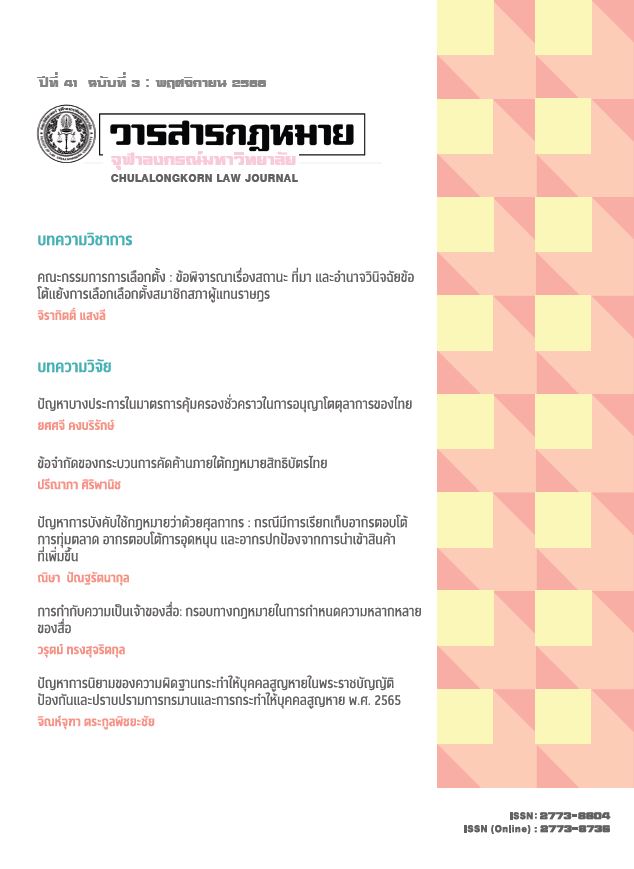คณะกรรมการการเลือกตั้ง : ข้อพิจารณาเรื่องสถานะ ที่มา และอำนาจวินิจฉัยข้อโต้แย้งการเลือกเลือกตั้งสมาชิกสภาผู้แทนราษฎร
Main Article Content
บทคัดย่อ
คณะกรรมการการเลือกตั้งเป็นองค์กรอิสระที่ถูกจัดตั้งขึ้นครั้งแรกโดยรัฐธรรมนูญแห่งราชอาณาจักรไทย พ.ศ. 2540 และยังคงได้รับการบัญญัติเรื่อยมาในรัฐธรรมนูญแห่งราชอาณาจักรไทย พ.ศ. 2550 และ 2560 มีหน้าที่หลักที่สำคัญคือ จัดและควบคุมการเลือกตั้งให้เป็นไปโดยสุจริตและเที่ยงธรรม ตลอดถึงวินิจฉัยข้อโต้แย้งอันเนื่องมาจากการเลือกตั้ง อย่างไรก็ดี การบัญญัติถึงโครงสร้างและอำนาจหน้าที่ของคณะกรรมการการเลือกตั้งไว้ในรัฐธรรมนูญอาจทำให้เกิดปัญหาสถานะความเป็นองค์กร และการถูกตรวจสอบได้ในระบบกฎหมาย อีกทั้งที่มาของคณะกรรมการการเลือกตั้งยังมีปัญหาเรื่องความชอบธรรมในทางประชาธิปไตย นอกจากนี้ การกำหนดให้คณะกรรมการการเลือกตั้งมีอำนาจหลายประการ โดยเฉพาะการจำกัดสิทธิของผู้สมัครรับเลือกตั้งซึ่งเป็นโทษอุปกรณ์ อาจนำมาซึ่งปัญหาการถูกตรวจสอบในทางตุลาการอีกด้วย
Article Details

อนุญาตภายใต้เงื่อนไข Creative Commons Attribution-NonCommercial-NoDerivatives 4.0 International License.
ลิขสิทธิ์และเนื้อหาในเว็บไซต์ของวารสารกฎหมาย (รวมถึง โดยไม่จำกัดเฉพาะ เนื้อหา รหัสคอมพิวเตอร์ งานศิลป์ ภาพถ่าย รูปภาพ ดนตรีกรรม โสตทัศนวัสดุ) เป็นกรรมสิทธิ์ของวารสารกฎหมาย และผู้ได้รับการโอนสิทธิทุกราย
1. วารสารกฎหมาย ให้อนุญาตให้คุณใช้สิทธิอันไม่เฉพาะเจาะจงที่สามารถถูกถอนเมื่อใดก็ได้ โดยไม่มีค่าใช้จ่าย ในการ
- เยี่ยมชมเว็บไซต์และเอกสารในเว็บไซต์นี้ จากคอมพิวเตอร์หรือเครื่องมือสื่อสารผ่านเว็บบราวเซอร์
- คัดลอกและจัดเก็บเว็บไซต์และเอกสารในเว็บไซต์นี้บนลงคอมพิวเตอร์ของคุณผ่านระบบความจำ cache
- สั่งพิมพ์เอกสารจากเว็บไซต์นี้สำหรับการใช้ส่วนตัวของคุณ
- ผลงานที่ได้รับการตีพิมพ์โดยวารสารกฎหมาย จุฬาลงกรณ์มหาวิทยาลัย ถูกคุ้มครองภายใต้ Creative Commons Attribution 4.0 International License ซึ่งอนุญาตให้ทุกคนสามารถคัดลอก แจกจ่าย ดัดแปลง ส่งต่อ ผลงานได้ ก็ต่อเมื่อผลงานและแหล่งข้อมูลได้รับการอ้างอิงอย่างเหมาะสม
2. วารสารกฎหมาย จุฬาลงกรณ์มหาวิทยาลัย สงวนสิทธิ์ไม่อนุญาตให้คุณใช้สิทธิอื่นใดที่เกี่ยวข้องกับเว็บไซต์และเอกสารบนเว็บไซต์นี้ เช่น การคัดลอก ดัดแปลง เปลี่ยนแปลง ส่งต่อ ตีพิมพ์ แจกจ่าย เผยแพร่ จัดแสดงในที่สาธารณะ ไม่ว่าจะในรูปแบบใดก็ตาม ซึ่งเว็บไซต์หรือเอกสารบนเว็บไซต์ โดยไม่อ้างอิงถึงแหล่งข้อมูลหรือโดยไม่ได้รับอนุญาตเป็นลายลักษณ์อักษรจากวารสารกฎหมาย จุฬาลงกรณ์มหาวิทยาลัย
3. คุณอาจขออนุญาตที่จะใช้เอกสารอันมีลิขสิทธิ์บนเว็บไซต์นี้โดยการเขียนอีเมลล์มายัง journal@law.chula.ac.th
4. วารสารกฎหมาย จุฬาลงกรณ์มหาวิทยาลัย เข้มงวดกับการคุ้มครองลิขสิทธิ์อย่างมาก หากวารสารกฎหมาย จุฬาลงกรณ์มหาวิทยาลัยพบว่าคุณได้ใช้เอกสารอันมีลิขสิทธิ์บนเว็บไซต์นี้โดยไม่ถูกต้องตามการอนุญาตให้ใช้สิทธิ ดังที่กล่าวไปข้างต้น วารสารกฎหมาย จุฬาลงกรณ์มหาวิทยาลัยอาจดำเนินคดีตามกฎหมายต่อคุณได้ เพื่อเรียกร้องค่าเสียหายที่เป็นตัวเงินและคำขอชั่วคราวให้คุณหยุดการใช้เอกสารดังกล่าว ทั้งนี้ คุณอาจถูกสั่งให้ชดใช้ค่าใช้จ่ายใดๆ ที่เกี่ยวข้องกับการดำเนินการตามกฎหมายนี้
หากคุณพบเห็นการใช้เอกสารอันมีลิขสิทธิ์ของวารสารกฎหมาย จุฬาลงกรณ์มหาวิทยาลัย ที่ขัดหรืออาจขัดต่อการอนุญาตให้ใช้สิทธิดังที่ได้กล่าวไปข้างต้น โดยเชื่อว่าได้ละเมิดลิขสิทธิ์ของคุณหรือของผู้อื่น สามารถร้องเรียนมาได้ที่ journal@law.chula.ac.th
เอกสารอ้างอิง
Benoît Camguilhem. Le contrôle administratif des élections. Revue du droit public n°6 du 1er novembre 2017.
Jean RIVERO. Droit Administratif. 14e éd. Dalloz, 1992.
กมลชัย รัตนสกาววงศ์. กว่าจะเป็นใบแดง,” ใน 4 ปี กกต. : เอกสารวิชาการเนื่องในงานวันสถาปนาสำนักงานคณะกรรมการการเลือกตั้ง. กรุงเทพฯ: สำนักงานคณะกรรมการการเลือกตั้ง, 2545.
กระมล ทองธรรมชาติ, สมบูรณ์ สุขสำราญ และปรีชา หงส์ไกรเลิศ. การเลือกตั้ง พรรคการเมือง และเสถียรภาพของรัฐบาล. กรุงเทพฯ: ฝ่ายวิจัย คณะรัฐศาสตร์ จุฬาลงกรณ์มหาวิทยาลัย, 2531.
ข้อ 41 ระเบียบของที่ประชุมใหญ่ศาลฎีกาว่าด้วยการพิจารณาและวินิจฉัยคดีเกี่ยวกับสิทธิสมัครรับเลือกตั้งและการเพิกถอนสิทธิสมัครรับเลือกตั้งหรือสิทธิเลือกตั้งในการเลือกตั้งสมาชิกสภาผู้แทนราษฎร พ.ศ. 2561
คณะกรรมการติดตามและสอดส่องการเลือกตั้งสมาชิกสภาผู้แทนราษฎร. การเลือกตั้งสมาชิกสภาผู้แทนราษฎร 22 มีนาคม พ.ศ. 2535. กรุงเทพฯ: บริษัทเยลโล่การพิมพ์, 2535.
คณะกรรมการปฏิรูปการเมือง. รายงานผลการทำงานของคณะกรรมการปฏิรูปการเมือง (คปก) (8 สิงหาคม 2538 – 7 พฤศจิกายน 2538). กรุงเทพฯ: คณะกรรมการปฏิรูปการเมือง, 2538.
คณะกรรมการองค์กรกลางการเลือกตั้ง. รายงานการเลือกตั้งสมาชิกสภาผู้แทนราษฎร เมื่อวันที่ 2 กรกฎาคม 2538. ไม่ปรากฏสถานที่พิมพ์ ไม่ปรากฏโรงพิมพ์ ไม่ปรากฏปีที่พิมพ์.
คำวินิจฉัยศาลรัฐธรรมนูญที่ 3/2541, 15/2541, 53/2542, 5/2543, 6/2543, 13/2543, 52/2546
คำวินิจฉัยศาลรัฐธรรมนูญที่ 9/2549
คำสั่งศาลปกครองสูงสุดที่ 84/2544
ฐากูร ศิริยุทธ์วัฒนา. กฎหมายรัฐธรรมนูญ : หลักพื้นฐานแห่งกฎหมายรัฐธรรมนูญและระบอบประชาธิปไตย. พิมพ์ครั้งที่ 7. กรุงเทพฯ: วิญญูชน, 2566.
ฐากูร ศิริยุทธ์วัฒนา. การคัดค้านผลการเลือกตั้งโดยผู้มีสิทธิเลือกตั้ง. กรุงเทพฯ: สถาบันพระปกเกล้า, 2561.
ธงชัย วินิจจะกุล. การเมืองเรื่องการกำหนดเขตเลือกตั้ง กรณีการเลือกตั้งกรุงเทพมหานคร เขต 12 และ 13 ในการเลือกตั้งทั่วไป พ.ศ. 2531. กรุงเทพฯ: มูลนิธิเพื่อการศึกษาประชาธิปไตยและการพัฒนา, 2533.
ธีระ สุธีวรางกูร. ศาลรัฐธรรมนูญกับการวินิจฉัยปัญหาเกี่ยวกับอำนาจหน้าที่ขององค์กรต่าง ๆ ตามรัฐธรรมนูญ. จดหมายข่าวศาลรัฐธรรมนูญ (พฤษภาคม-มิถุนายน 2542): 5.
บรรเจิด สิงคะเนติ. ปัญหาขององค์กรอิสระตามรัฐธรรมนูญ. วารสารวิชาการศาลปกครอง 1, 3 (กันยายน - ธันวาคม 2544).
บรรเจิด สิงคะเนติ. หลักพื้นฐานสิทธิเสรีภาพและศักดิ์ศรีความเป็นมนุษย์. พิมพ์ครั้งที่ 6. กรุงเทพฯ: วิญญูชน, 2562).
บวรศักดิ์ อุวรรณโณ. เจตนารมณ์รัฐธรรมนูญ. กรุงเทพฯ: สถาบันพระปกเกล้า, 2544.
บุญศรี มีวงศ์อุโฆษ. การเลือกตั้งและพรรคการเมือง : บทเรียนจากเยอรมัน. กรุงเทพฯ: สถาบันนโยบายศึกษา, 2542.
แบร์นาร์ ลาเวียร์ (Bernard Lavergne). สิทธิทั่วไปในการออกเสียงเลือกตั้งและอำนาจของรัฐ. แปลโดย พงศ์เพ็ญ ศกุนตาภัย. กรุงเทพฯ: สภาวิจัยแห่งชาติ, 2513.
ปฏิญญาสากลว่าด้วยสิทธิมนุษยชน. กรุงเทพฯ: กรมองค์การระหว่างประเทศ กระทรวงการต่างประเทศ, 2551.
ประจักษ์ ก้องกีรติ. รายงานการวิจัยฉบับสมบูรณ์ เรื่อง ระบบเลือกตั้งเพื่อลดความขัดแย้งและส่งเสริมคุณภาพประชาธิปไตย. กรุงเทพฯ: วิทยาลัยการเมืองการปกครอง สถาบันพระปกเกล้า, 2565.
ประชา ธิปไตย. องค์กรกลางกับการเลือกตั้ง : ปัญหาและอุปสรรคในการปฏิบัติหน้าที่. รัฐสภาสาร 44, 7 (กรกฎาคม 2539): 9-14.
ประณต นันทิยะกุล. คณะกรรมการการเลือกตั้งกับการจัดการเลือกตั้งในอินเดีย. วารสารธรรมศาสตร์ 3, 3 (กันยายน - ธันวาคม 2540): 91-97.
ประพันธ์ นัยโกวิท. บทบาทและอำนาจหน้าที่ของคณะกรรมการการเลือกตั้ง. กรุงเทพฯ: สำนักงานคณะกรรมการการเลือกตั้ง, 2551.
ปัญญา อุดชาชน. องค์กรตามรัฐธรรมนูญ. วารสารศาลรัฐธรรมนูญ 1, 3 (กันยายน-ธันวาคม 2542): 55.
ปัทมา สูบกำปัง. องค์กรอิสระ : ดุลแห่งอำนาจในระบบการเมืองการปกครองของไทย. วารสารสถาบันพระปกเกล้า 13, 1 (มกราคม-เมษายน 2558): 159.
พรสันต์ เลี้ยงบุญเลิศชัย. หลักพื้นฐานทางกฎหมายปกครอง : ข้อความคิดว่าด้วยรัฐ ฝ่ายปกครอง และอำนาจทางปกครอง. พิมพ์ครั้งที่ 2. กรุงเทพฯ: วิญญูชน, 2565.
พระราชบัญญัติการเลือกตั้งเครือจักรภพ ค.ศ. 1918 (Commonwealth Electoral Act 1918)
พระราชบัญญัติคณะกรรมการการเลือกตั้ง พ.ศ. 2540 ราชกิจจานุเบกษา เล่ม 114 ตอนที่ 48 ก วันที่ 18 กันยายน 2540.
พระราชบัญญัติประกอบรัฐธรรมนูญว่าด้วยการเลือกตั้งสมาชิกสภาผู้แทนราษฎรและสมาชิกวุฒิสภา พ.ศ. 2541 ราชกิจจานุเบกษา 9 มิถุนายน 2541 เล่ม 115 ตอนที่ 35 ก.
พระราชบัญญัติประกอบรัฐธรรมนูญว่าด้วยการเลือกตั้งสมาชิกสภาผู้แทนราษฎรและสมาชิกวุฒิสภา พ.ศ. 2541 มาตรา 85/1 ซึ่งแก้ไขเพิ่มเติมโดยพระราชบัญญัติประกอบรัฐธรรมนูญว่าด้วยการเลือกตั้งสมาชิกสภาผู้แทนราษฎรและสมาชิกวุฒิสภา (ฉบับที่ 3) พ.ศ. 2543
พระราชบัญญัติประกอบรัฐธรรมนูญว่าด้วยการเลือกตั้งสมาชิกสภาผู้แทนราษฎรและสมาชิกวุฒิสภา พ.ศ. 2541 มาตรา 85/2 ซึ่งแก้ไขเพิ่มเติมโดยพระราชบัญญัติประกอบรัฐธรรมนูญว่าด้วยการเลือกตั้งสมาชิกสภาผู้แทนราษฎรและสมาชิกวุฒิสภา (ฉบับที่ 3) พ.ศ. 2543
พระราชบัญญัติประกอบรัฐธรรมนูญว่าด้วยการเลือกตั้งสมาชิกสภาผู้แทนราษฎรและสมาชิกวุฒิสภา พ.ศ. 2541 มาตรา 85/3 ซึ่งแก้ไขเพิ่มเติมโดยพระราชบัญญัติประกอบรัฐธรรมนูญว่าด้วยการเลือกตั้งสมาชิกสภาผู้แทนราษฎรและสมาชิกวุฒิสภา (ฉบับที่ 3) พ.ศ. 2543
พระราชบัญญัติประกอบรัฐธรรมนูญว่าด้วยการเลือกตั้งสมาชิกสภาผู้แทนราษฎรและสมาชิกวุฒิสภา พ.ศ. 2541 มาตรา 85/9 ซึ่งแก้ไขเพิ่มเติมโดยพระราชบัญญัติประกอบรัฐธรรมนูญว่าด้วยการเลือกตั้งสมาชิกสภาผู้แทนราษฎรและสมาชิกวุฒิสภา (ฉบับที่ 3) พ.ศ. 2543
พระราชบัญญัติประกอบรัฐธรรมนูญว่าด้วยการออกเสียงประชามติ พ.ศ. 2541 ราชกิจจานุเบกษา เล่ม 115 ตอนที่ 102 ก 31 ธันวาคม 2541.
พระราชบัญญัติประกอบรัฐธรรมนูญว่าด้วยคณะกรรมการการเลือกตั้ง พ.ศ. 2541 ราชกิจจานุเบกษา เล่ม 115 ตอนที่ 35 ก 9 มิถุนายน 2541.
พระราชบัญญัติประกอบรัฐธรรมนูญว่าด้วยพรรคการเมือง พ.ศ. 2541 ราชกิจจานุเบกษา เล่ม 115 ตอนที่ 35 ก 9 มิถุนายน 2541.
พระราชบัญญัติพรรคการเมือง การเลือกตั้ง และประชามติ ค.ศ. 2000 (The Political Parties, Elections and Referendums Act 2000)
มาตรา 103 พระราชบัญญัติประกอบรัฐธรรมนูญว่าด้วยการเลือกตั้งสมาชิกสภาผู้แทนราษฎรและการได้มาซึ่งสมาชิกวุฒิสภา พ.ศ. 2550
มาตรา 104 พระราชบัญญัติประกอบรัฐธรรมนูญว่าด้วยการเลือกตั้งสมาชิกสภาผู้แทนราษฎรและการได้มาซึ่งสมาชิกวุฒิสภา พ.ศ. 2550
มาตรา 105 พระราชบัญญัติประกอบรัฐธรรมนูญว่าด้วยการเลือกตั้งสมาชิกสภาผู้แทนราษฎรและการได้มาซึ่งสมาชิกวุฒิสภา พ.ศ. 2550
มาตรา 111 พระราชบัญญัติประกอบรัฐธรรมนูญว่าด้วยการเลือกตั้งสมาชิกสภาผู้แทนราษฎรและการได้มาซึ่งสมาชิกวุฒิสภา พ.ศ. 2550
มาตรา 111 และมาตรา 116 พระราชบัญญัติประกอบรัฐธรรมนูญ ว่าด้วยการเลือกตั้งสมาชิกสภาผู้แทนราษฎรและการได้มาซึ่งสมาชิกวุฒิสภา พ.ศ. 2550
มาตรา 132 พระราชบัญญัติประกอบรัฐธรรมนูญว่าด้วยการเลือกตั้งสมาชิกสภาผู้แทนราษฎร พ.ศ. 2561
มาตรา 133 พระราชบัญญัติประกอบรัฐธรรมนูญว่าด้วยการเลือกตั้งสมาชิกสภาผู้แทนราษฎร พ.ศ. 2561
มาตรา 137 พระราชบัญญัติประกอบรัฐธรรมนูญว่าด้วยการเลือกตั้งสมาชิกสภาผู้แทนราษฎร พ.ศ. 2561
มาตรา 138 พระราชบัญญัติประกอบรัฐธรรมนูญว่าด้วยการเลือกตั้งสมาชิกสภาผู้แทนราษฎร พ.ศ. 2561
มาตรา 139 พระราชบัญญัติประกอบรัฐธรรมนูญว่าด้วยการเลือกตั้งสมาชิกสภาผู้แทนราษฎร พ.ศ. 2561
มาตรา 225 รัฐธรรมนูญแห่งราชอาณาจักรไทย พ.ศ. 2560
มาตรา 226 วรรคหนึ่ง รัฐธรรมนูญแห่งราชอาณาจักรไทย พ.ศ. 2560
มาตรา 239 รัฐธรรมนูญแห่งราชอาณาจักรไทย พ.ศ. 2550
มาตรา 5 พระราชบัญญัติวิธีปฏิบัติราชการทางปกครอง พ.ศ. 2539
มาตรา 94 พระราชบัญญัติประกอบรัฐธรรมนูญว่าด้วยการเลือกตั้งสมาชิกสภาผู้แทนราษฎรและสมาชิกวุฒิสภา พ.ศ. 2541
มาตรา 95 พระราชบัญญัติประกอบรัฐธรรมนูญว่าด้วยการเลือกตั้งสมาชิกสภาผู้แทนราษฎรและสมาชิกวุฒิสภา พ.ศ. 2541
มาตรา 96 พระราชบัญญัติประกอบรัฐธรรมนูญว่าด้วยการเลือกตั้งสมาชิกสภาผู้แทนราษฎรและสมาชิกวุฒิสภา พ.ศ. 2541
รชณัฐ มะโนแสน. ที่มาและปัญหาความชอบธรรมทางประชาธิปไตยของตุลาการศาลรัฐธรรมนูญไทย. วิทยานิพนธ์นิติศาสตรมหาบัณฑิต คณะนิติศาสตร์ มหาวิทยาลัยธรรมศาสตร์, 2564.
รชณัฐ มะโนแสน. หลักประชาธิปไตยกับวุฒิสภาตามรัฐธรรมนูญแห่งราชอาณาจักรไทย พ.ศ. 2560. วารสารนิติศาสตร์ มหาวิทยาลัยแม่ฟ้าหลวง 6, 1 (มกราคม-มิถุนายน 2566): 26.
รัฐธรรมนูญแห่งราชอาณาจักรไทย (ฉบับที่ 5) พ.ศ. 2538 ราชกิจานุเบกษา เล่ม 112 ตอนที่ 7 ก.
รัฐธรรมนูญแห่งราชอาณาจักรไทย พ.ศ. 2540
รัฐธรรมนูญแห่งราชอาณาจักรไทย พ.ศ. 2550
รัฐบัญญัติช่วยเหลือกิจการการเลือกตั้งอเมริกา ค.ศ. 2002 (Help America Vote Act 2002)
เรวัตร จันทร์ประเสริฐ และฤทัย หงส์สิริ. ความหมายของ “องค์กรต่าง ๆ ตามรัฐธรรมนูญ” ตามรัฐธรรมนูญมาตรา 266. วารสารศาลรัฐธรรมนูญ 2 (พฤษภาคม-สิงหาคม 2542): 91.
ลิขิต ธีรเวคิน. ความถูกต้องตามกฎหมาย ความชอบธรรมทางการเมือง และธรรมแห่งอำนาจ. กรุงเทพฯ: สำนักพิมพ์มหาวิทยาลัยธรรมศาสตร์, 2556.
วรเจตน์ ภาคีรัตน์. กฎหมายวิธีปฏิบัติราชการทางปกครอง. กรุงเทพฯ: สถาบันพระปกเกล้า, 2554.
วรเจตน์ ภาคีรัตน์. การเปลี่ยนแปลงแนวคำวินิจฉัย และผลผูกพันของคำวินิจฉัยของคำวินิจฉัยของศาลรัฐธรรมนูญ : ศึกษากรณีศาลสูงสุดของสหรัฐอเมริกาและศาลรัฐธรรมนูญแห่งสหพันธ์สาธารณรัฐเยอรมนี. กรุงเทพฯ: มิสเตอร์ก๊อปปี้, 2550.
วรเจตน์ ภาคีรัตน์. การเลือกตั้งในรัฐเสรีประชาธิปไตย. วารสารศาลรัฐธรรมนูญ 1, 3 (กันยายน-ธันวาคม 2542): 97-98.
วรเจตน์ ภาคีรัตน์. คำสอนว่าด้วยรัฐและหลักกฎหมายมหาชน. พิมพ์ครั้งที่ 3. กรุงเทพฯ: อ่านกฎหมาย, 2564.
วรเจตน์ ภาคีรัตน์. ด้วยกฎหมายและอุดมการณ์. กรุงเทพฯ: ไชน์พับลิชชิ่งเฮ้าส์, 2558.
วรเจตน์ ภาคีรัตน์. รายงานวิจัย เรื่อง องค์กรอิสระตามบทบัญญัติของรัฐธรรมนูญแห่งราชอาณาจักรไทย พุทธศักราช 2540. กรุงเทพฯ: คณะกรรมการวิจัยและสัมมนา คณะนิติศาสตร์ มหาวิทยาลัยธรรมศาสตร์, 2550.
วรพจน์ วิศรุตพิชญ์. การปกครองระบอบประชาธิปไตยภายใต้รัฐธรรมนูญ. วารสารศาลรัฐธรรมนูญ 20, 60 (กันยายน-ธันวาคม 2561): 272.
วิษณุ วรัญญู, ปิยะศาสตร์ ไขว้พันธุ์ และเจตน์ สถาวรศีลพร. ตำรากฎหมายปกครองว่าด้วยกฎหมายปกครองทั่วไป. กรุงเทพฯ: สำนักงานคณะกรรมการกฤษฎีกา, 2551.
วิษณุ วรัญญู. ปาฐกถา เรื่อง “รัฐธรรมนูญกับการสร้างธรรมาภิบาลและประชาธิปไตย. ในเวทีสัมมนา 15 ปีองค์กรอิสระของรัฐ, ณ โรงแรมพลาซ่าแอทธินี กรุงเทพฯ วันศุกร์ที่ 1 มีนาคม 2556.
วิษณุ วรัญญู. องค์กรของรัฐที่เป็นอิสระ Independent administrative body : รายงานการวิจัย. กรุงเทพฯ: สำนักงานกองทุนสนับสนุนการวิจัย, 2538.
สมคิด เลิศไพฑูรย์ และบรรเจิด สิงคะเนติ. เขตอำนาจศาลรัฐธรรมนูญไทย มาตรา 264 และมาตรา 266. กรุงเทพฯ: สำนักงานศาลรัฐธรรมนูญ 2543.
สมยศ เชื้อไทย. รัฐธรรมนูญแห่งราชอาณาจักรไทย พุทธศักราช 2540 ฉบับใช้เรียน. กรุงเทพฯ: วิญญูชน, 2546.
สมาคมทนายความแห่งประเทศไทย. ข้อสังเกตและเหตุผลประกอบข้อยุติในการสัมมนาทางวิชาการกฎหมายเกี่ยวกับ “การเลือกตั้ง 251”. กรุงเทพฯ: การพิมพ์พระนคร, 2538.
สำนักงานคณะกรรมการการเลือกตั้ง. รายงานผลการปฏิบัติงานคณะกรรมการการเลือกตั้ง ประจำปีงบประมาณ พ.ศ. 2551. กรุงเทพฯ: สำนักงานคณะกรรมการการเลือกตั้ง, 2551.
สีดา สอนศรี. รายงานวิจัย เรื่อง บทบาทของคณะกรรมการการเลือกตั้งของประเทศไทย. กรุงเทพฯ: สถาบันไทยคดีศึกษา มหาวิทยาลัยธรรมศาสตร์, 2546.
หยุด แสงอุทัย. หลักรัฐธรรมนูญและกฎหมายเลือกตั้งทั่วไป. พิมพ์ครั้งที่ 7. กรุงเทพฯ: คณะรัฐศาสตร์ มหาวิทยาลัยธรรมศาสตร์, 2513.
อวิการัตน์ นิยมไทย. ที่มาของคณะกรรมการการเลือกตั้ง. จุลนิติ 8, 5 (กันยายน - ตุลาคม 2554): 156-157.
อาภัสรา จินตนะพัฒน์. รูปแบบและฐานะขององค์กรที่ทำหน้าที่ควบคุมดูแลการเลือกตั้งสมาชิกสภาผู้แทนราษฎร. วิทยานิพนธ์ปริญญานิติศาสตรมหาบัณฑิต ภาควิชานิติศาสตร์ บัณฑิตวิทยาลัย จุฬาลงกรณ์มหาวิทยาลัย, 2538.
อุดม รัฐอมฤต. ชุดการเรียนด้วยตนเอง หลักสูตร การเรียนรู้กฎหมายมหาชนด้วยตนเอง : หมวดที่ 4 รัฐธรรมนูญ ชุดวิชาที่ 3 องค์กรอิสระตามรัฐธรรมนูญ. นนทบุรี: สถาบันพัฒนาข้าราชการพลเรือน สำนักงาน กพ., 2548.


